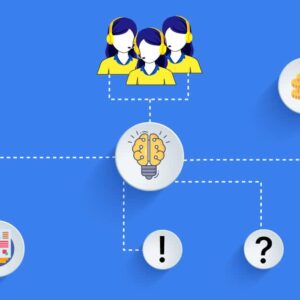Customer success manager: Definition, Roles and factors
Customer success manager: Definition, Roles and factors SHARE THE ARTICLE ON Share on facebook Share on twitter Share on linkedin Table of Contents What is
SHARE THE ARTICLE ON

Harnessing the power of artificial intelligence (AI) in market research has become critical in the digital age. The combination of artificial intelligence and market research has transformed the way firms obtain insights, make educated decisions, and remain ahead of the competition. This article goes into the world of artificial intelligence-powered market research tools, their significance, and the top must-have tools that any wise marketer should consider including in their plan.
The term “AI-Powered Market Research Tools” refers to a group of software programs and platforms that use artificial intelligence (AI) and machine learning techniques to improve various areas of the market research process. These applications automate data gathering, processing, and interpretation, allowing organizations to obtain a better understanding of consumer behavior, market trends, and competitive landscapes.
These technologies can process enormous volumes of data, discover patterns, anticipate future trends, and deliver actionable insights by leveraging AI capabilities, thereby supporting businesses in making better educated and strategic decisions based on data-driven evidence.
Traditional market research methodologies frequently fall short in dealing with the volume and complexity of data accessible in the digital age. AI solutions provide automation and precision to the process, allowing firms to make data-driven decisions. These tools not only reduce time but also improve accuracy, resulting in better strategic decisions.
Read how Voxco helped HRI conduct complex market research and accelerate insight generation.
Traditional market research approaches frequently entail manual data gathering and processing, which is time-consuming and susceptible to human bias. AI-powered technologies, on the other hand, automate procedures, analyze large datasets fast, and give actionable insights with greater accuracy.
Feature | Traditional Market Research Tools | Modern AI-Powerd Market Research Tools |
Data Collection and Analysis |
|
|
Speed and Efficiency |
|
|
Accuracy and Reliability |
|
|
|
| |
Personalization and Segmentation |
|
|
Cost Considerations |
|
|
In essence, the change from old to modern market research instruments reflects a journey from manual and time-consuming practices to data-driven, automated processes. While traditional approaches have their advantages, the capabilities of AI-powered solutions in terms of speed, accuracy, predictive insights, and personalized strategies make them important assets for organizations attempting to navigate today’s market scenario.
Here are five must-have AI tools for effective market research:
These artificial intelligence-powered market research tools enable firms to turn raw data into meaningful insights, allowing for informed decision-making and strategic planning. Whether it’s advanced survey capabilities, sentiment analysis, predictive modeling, or image identification, each tool offers a distinct set of features to meet a variety of market research requirements.
AI-powered market research tools are the guiding compass that navigates through the sea of information, transforming it into usable insights, in a data-driven business landscape. You’ll be well-equipped to comprehend the market’s intricate patterns, make informed judgments, and stay ahead in the competitive race if you understand the power of these tools and choose the correct ones for your purposes.
Keep in mind that the world of AI tools for market research is continuously changing, As the field of AI tools for market research continues to evolve, staying up-to-date with the latest advancements and case studies will be crucial for enhancing strategic capabilities. By embracing AI-powered market research tools, businesses can navigate the data-driven terrain, transforming raw information into actionable insights that drive success and innovation.
100+ question types
Advanced logic
White-label
Auto-translations in 100+ languages
Yes, there are AI-powered solutions created expressly for market research. Artificial intelligence and machine learning techniques are used in these technologies to automate and improve many areas of the market research process, such as data collecting, processing, and interpretation.
AI tools for market research include text analysis, predictive analytics, picture analysis, and survey feedback analysis. There are several AI tools available for conducting market studies. Some popular options include
The “best” AI tool is decided by your specific research needs. Voxco, Lexalytics, RapidMiner, and Qualtrics are examples of tools that can be used to suit a range of research objectives.
Yes, artificial intelligence (AI) tools such as Voxco, Crimson Hexagon, and Lexalytics are developed to analyze social media conversations and sentiments. They assist organizations in gaining a better understanding of consumer opinions, preferences, and brand impressions on social media platforms.
Yes, ethical considerations for the use of artificial intelligence in research operations include data privacy, unbiased analysis, and open information. It is vital to observe ethical laws and legislation while using AI approaches in market research.
Customer success manager: Definition, Roles and factors SHARE THE ARTICLE ON Share on facebook Share on twitter Share on linkedin Table of Contents What is

CX Predictions – The Evolution of Customer Experience (CX) SHARE THE ARTICLE ON Table of Contents Like all other domains in the world of business,

IVR-Umfrage-Software Transformieren Sie Ihren Erkenntnisgewinnungsprozess Nutzen Sie unseren ausführlichen Leitfaden für Online-Umfragen, um einen praktikablen Prozess zur Erfassung von Feedback zu entwickeln. Download Now SHARE

This year, we celebrate our 20th year in Paris. Our Paris office is a central hub for all of our European operations, supporting hundreds and hundreds

Want to reduce Sampling Error? Here’s what you need to know! Try a free Voxco Online sample survey! Unlock your Sample Survey SHARE THE ARTICLE

Regression Testing SHARE THE ARTICLE ON Share on facebook Share on twitter Share on linkedin Table of Contents What is Regression Testing? When software developers
We use cookies in our website to give you the best browsing experience and to tailor advertising. By continuing to use our website, you give us consent to the use of cookies. Read More
| Name | Domain | Purpose | Expiry | Type |
|---|---|---|---|---|
| hubspotutk | www.voxco.com | HubSpot functional cookie. | 1 year | HTTP |
| lhc_dir_locale | amplifyreach.com | --- | 52 years | --- |
| lhc_dirclass | amplifyreach.com | --- | 52 years | --- |
| Name | Domain | Purpose | Expiry | Type |
|---|---|---|---|---|
| _fbp | www.voxco.com | Facebook Pixel advertising first-party cookie | 3 months | HTTP |
| __hstc | www.voxco.com | Hubspot marketing platform cookie. | 1 year | HTTP |
| __hssrc | www.voxco.com | Hubspot marketing platform cookie. | 52 years | HTTP |
| __hssc | www.voxco.com | Hubspot marketing platform cookie. | Session | HTTP |
| Name | Domain | Purpose | Expiry | Type |
|---|---|---|---|---|
| _gid | www.voxco.com | Google Universal Analytics short-time unique user tracking identifier. | 1 days | HTTP |
| MUID | bing.com | Microsoft User Identifier tracking cookie used by Bing Ads. | 1 year | HTTP |
| MR | bat.bing.com | Microsoft User Identifier tracking cookie used by Bing Ads. | 7 days | HTTP |
| IDE | doubleclick.net | Google advertising cookie used for user tracking and ad targeting purposes. | 2 years | HTTP |
| _vwo_uuid_v2 | www.voxco.com | Generic Visual Website Optimizer (VWO) user tracking cookie. | 1 year | HTTP |
| _vis_opt_s | www.voxco.com | Generic Visual Website Optimizer (VWO) user tracking cookie that detects if the user is new or returning to a particular campaign. | 3 months | HTTP |
| _vis_opt_test_cookie | www.voxco.com | A session (temporary) cookie used by Generic Visual Website Optimizer (VWO) to detect if the cookies are enabled on the browser of the user or not. | 52 years | HTTP |
| _ga | www.voxco.com | Google Universal Analytics long-time unique user tracking identifier. | 2 years | HTTP |
| _uetsid | www.voxco.com | Microsoft Bing Ads Universal Event Tracking (UET) tracking cookie. | 1 days | HTTP |
| vuid | vimeo.com | Vimeo tracking cookie | 2 years | HTTP |
| Name | Domain | Purpose | Expiry | Type |
|---|---|---|---|---|
| __cf_bm | hubspot.com | Generic CloudFlare functional cookie. | Session | HTTP |
| Name | Domain | Purpose | Expiry | Type |
|---|---|---|---|---|
| _gcl_au | www.voxco.com | --- | 3 months | --- |
| _gat_gtag_UA_3262734_1 | www.voxco.com | --- | Session | --- |
| _clck | www.voxco.com | --- | 1 year | --- |
| _ga_HNFQQ528PZ | www.voxco.com | --- | 2 years | --- |
| _clsk | www.voxco.com | --- | 1 days | --- |
| visitor_id18452 | pardot.com | --- | 10 years | --- |
| visitor_id18452-hash | pardot.com | --- | 10 years | --- |
| lpv18452 | pi.pardot.com | --- | Session | --- |
| lhc_per | www.voxco.com | --- | 6 months | --- |
| _uetvid | www.voxco.com | --- | 1 year | --- |